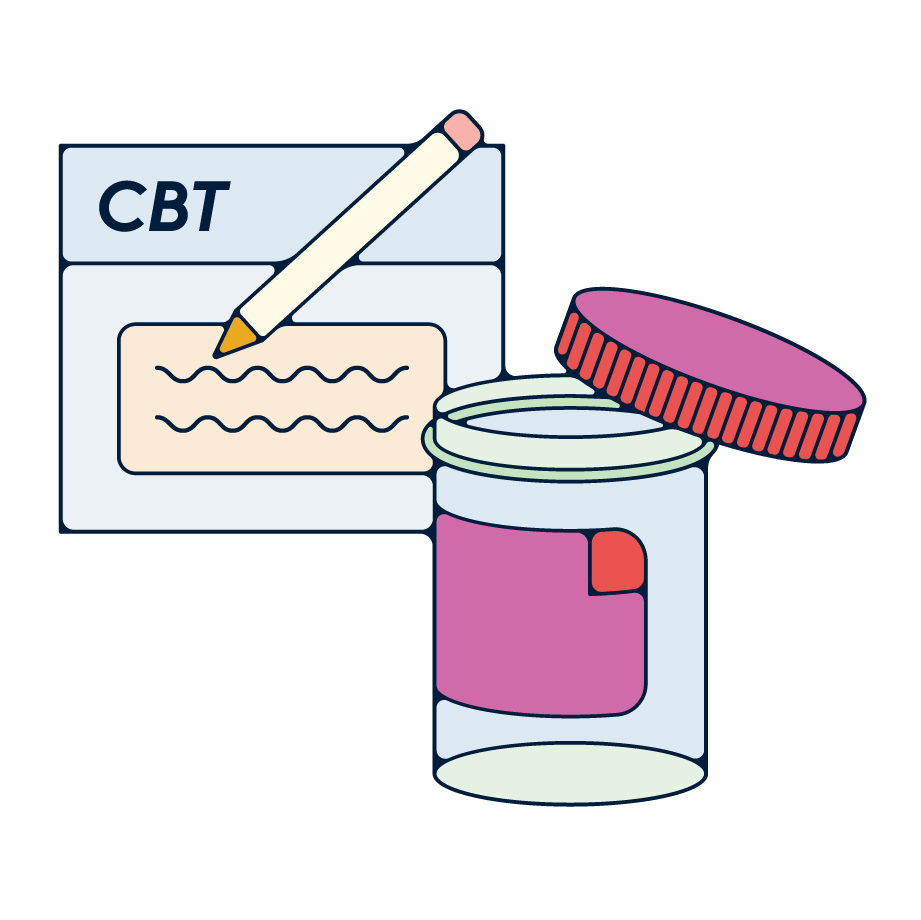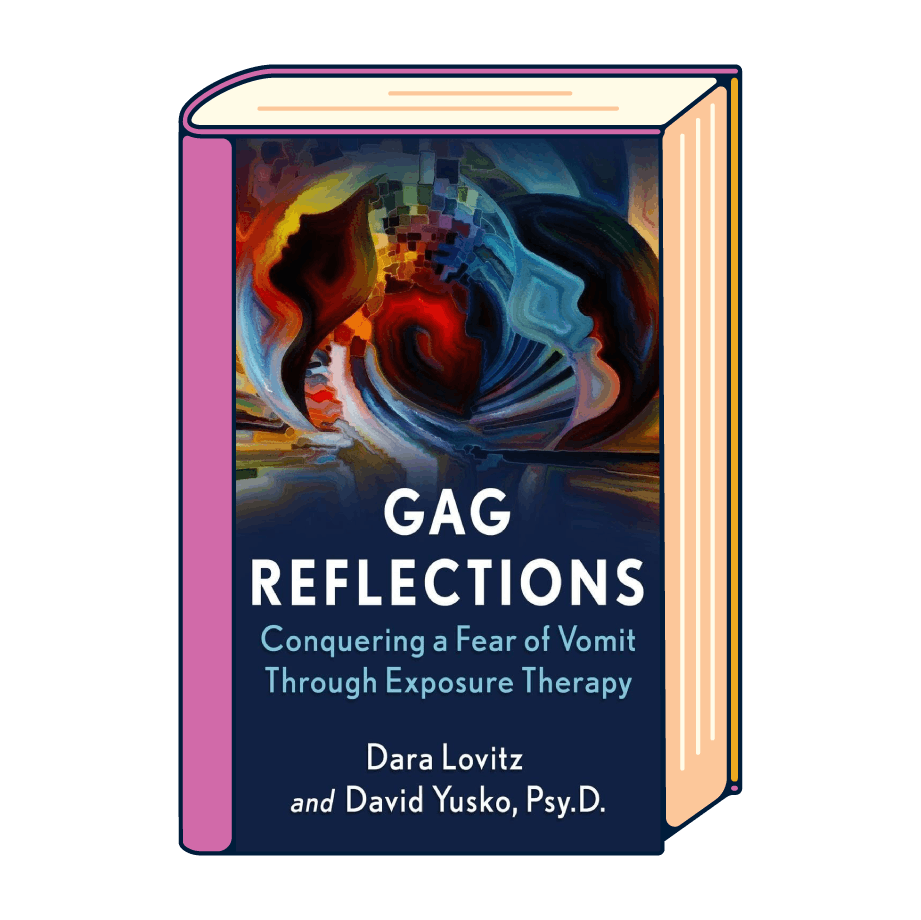Table of contents
1. What exactly is emetophobia?
2. What exactly is morning sickness?
3. How might a pregnant woman with emetophobia be impacted by morning sickness?
4. What’s the advice for pregnant people with emetophobia?
Written by Izzie Price
Medically reviewed by Sarah Montagu (RN DFSRH, BSc)
Illustrated by Valko Slavov
For over three decades, Dara Lovitz lived what she describes as a “shell of a life”, due to her emetophobia: A phobia of vomit.
“I was disturbed by other people vomiting and I did everything I could to a
void vomiting myself,” the now 46-year-old says. “I went through childhood riddled with anxiety about crowds, amusement parks, long car rides, etc. When I got older, I avoided parties, bars and gatherings where people would be drinking or doing drugs. I also avoided drugs and drinking myself; I avoided medication for fear of side effects.”
Dara did her best to avoid any scenarios in which she might be at risk of vomiting. But, of course, there’s one scenario where puking may just be inevitable: Morning sickness. So there lies the big question: How can someone with a debilitating fear of vomit cope with pregnancy, if said pregnancy – as many do – involves regularly getting sick?
What exactly is emetophobia?
“Emetophobia can manifest as either the fear of oneself vomiting, of others around you vomiting, or both,” says Catherine Schuler, PsyD, Psychologist at the Center for Anxiety & Behaviour Therapy. “As you can imagine, this can impact a person significantly and severely restrict their ability to engage in life.”
“Emetophobics become immediately fearful any time they perceive they could themselves get sick and throw up, or they could be in the vicinity of someone else throwing up – whether in person or watching it on a video, or hearing about it from a story,” expands David Yusko, PsyD Clinical Psychologist and Co-Founder of Center for Anxiety & Behaviour Therapy.
As with any phobia, emetophobics will often do anything they can to avoid coming into contact with the object of their fear.
“I have seen [emetophobia] impact people’s choice of career (e.g.) choosing not to be a nurse or teacher), dating life (fear of going out and getting sick), [and] choice to have children,” says Schuler.
Yusko agrees. “I have treated women who wanted to have a family but were unable to because of how strong their fear of morning sickness can be – strong enough to stop them from moving forward for something they really want,” he explains. “That is the essence of how devastating this disorder can be.”
Dara can relate. “I avoided pregnancy for several years [because] I was terrified of morning sickness,” she says.

What exactly is morning sickness?
“Morning sickness is a bit of a misnomer; it can happen any time during day or night and can be quite impactful to a pregnant person’s functioning – nausea and possible vomiting can build slowly or come seemingly out of the blue,” says Catharine McDonald, MS, NCC, LPH, PMH-C: Reproductive Mental Health Therapist and Clinical Director of Growing Well Counseling in Tolland, CT. “This pregnancy symptom - which affects 70-80% of pregnant women - may come and go, it may or may not follow a daily pattern, and for many it improves as the first trimester concludes; but for some it can continue through the pregnancy.”
“Morning sickness often has a cyclical effect,” explains Linda Kondilis, PhD, Reproductive Health Psychologist and Owner of Orama Wellness. “While small meals throughout the day might help alleviate symptoms, it can be challenging for individuals who are nauseous and vomiting to find the motivation to eat.
“This can significantly affect a pregnant person’s quality of life,” Kondilis continues. “Lack of proper nutrition may trigger fatigue, which can be compounded by the general exhaustion many individuals experience during pregnancy. Nausea, vomiting [and] fatigue can have a significant impact on someone’s mood, executive functioning and translate to their ability to work inside or outside of their home. Communication with family, friends and coworkers is likely to be impacted as well. Morning sickness also contributes to isolation because of a lack of desire to engage socially.”
Throw in emetophobia, of course, and you’ve got a cocktail of anxiety, fear and dread. As Dara says: “The idea that you could be nauseated or vomiting every day of your first trimester (or – heaven forbid – the entire pregnancy) is too much for an emetophobe to bear.”
How might a pregnant woman with emetophobia be impacted by morning sickness?
“A pregnant woman with emetophobia is likely to be very afraid of experiencing morning sickness,” Schuler acknowledges. “If it does occur, though, it is likely to be helpful to her (contrary to expectations!). This is because the best way to eliminate a fear is through exposure to the feared stimulus. The more she avoids the possibility of vomiting, the worse her fear becomes; but if a woman vomits regularly, her fear of vomiting will naturally decrease as she repeatedly experiences herself vomiting and being okay.
“By repeatedly learning that she survives vomiting, she will learn to be less afraid of it,” Schuler continues. “It is actually pregnant women with emetophobia who do not experience morning sickness who are likely to suffer the most; they do not get the opportunity to learn that vomiting is okay, and instead live in fear of the possibility.”
Dara was terrified at the prospect – “You almost have to convince yourself that it won’t happen to you,” she says – but her experience of morning sickness ended up being more or less okay.
“I chose to listen to the stories of women who said they didn’t get sick at all (like my mother, which was very helpful to know!), vs. the stories of women who were sick,” Dara explains. “Because I wasn’t a puker, by nature, I convinced myself there was a low likelihood I’d get morning sickness.”
Dara was pregnant with twins, which meant she had higher levels of HCG (pregnancy hormone); and HCG is a major contributing factor for morning sickness, so Dara was nauseous for most of her first trimester. She knew that, for her, this nausea was also tied to low blood sugar, so she developed a mantra: ABC, which stood for ‘Always Be Chewing’. “I carried crackers or pretzels or a bagel with me everywhere,” she says. “I’d grab a cracker or tear off a piece of bagel and munch on it every 10 minutes or so. I was nauseated before I ate and after I ate, but not while I ate; hence ABC.”
Dara was amazed by how accepting she was of the nausea in her body. “I didn’t love it, but I didn’t become overwhelmed by it, as a pre-pregnant me would have thought,” she explains. ��“I remember being the happiest I’d ever been (mood-wise) while pregnant, and I’m wondering if those ‘happy pregnancy hormones’ helped counterbalance the anxiety I otherwise felt as an emetophobe.”

What’s the advice for pregnant people with emetophobia?
In short: Seek help and support. It’s out there; it’s just a question of asking for it.
“It is very easy to worry about the future,” says Kondilis. “‘Will this ever go away?’; ‘What if I can’t tolerate getting pregnant again?’. It is so common to have fearful thoughts. Although much easier said than done, the best approach is to stay present and take the pregnancy one day at a time; [and] I encourage anyone struggling with emetophobia to speak up and reach out for support. Let friends, family and coworkers know about your challenges so they can offer help during this time.”
McDonald agrees. “Let your healthcare provider know there’s both a physical [and] mental component and you have intense anxiety or distress about morning sickness – if they don’t take you seriously, get a second opinion! Everyone deserves a provider who listens to and takes their concerns seriously,” she says.
Yusko, too, encourages pregnant people to reach out to their medical providers. “I know [this] can be embarrassing, [but] it is a legitimate and significant medical condition that your doctors should be aware of,” he explains. “Doctors may be able to offer antiemetic medications.”
But seeking help doesn’t only apply to your medical providers; nor should you only reach out for support when you’re pregnant. There is longer-term help out there, too; as Dara can attest.
Dara describes how she’d grow increasingly irritable when having to expend energy worrying about vomit. “It affected my home life and I knew I needed serious help the day I panicked and lost consciousness when my infant daughter vomited on me,” she explains. “Instead of helping her, I was face-planted on her bedroom carpet.”
This prompted her to undergo ERP (Exposure and Response Prevention) therapy with Dr. Yusko. “I could talk all day about life-after-recovery compared to living-with-the-phobia,” she says. “My advice for all emetophobes, pregnant or not, is to seek professional treatment with an ERP specialist. In four months, I was on the other side of the phobia and completely turned my life around. I only wish I had done the work sooner so that I could have enjoyed life more.”

Dara and Dr. Yusko have since co-authored a book – Gag Reflections: Conquering a Fear of Vomit Through Exposure – and, like Dara, Yusko also emphasises that long-term help is out there.
“Therapists trained in exposure and response prevention therapy can be very helpful for anyone struggling with emetophobia,” he explains. “This is a disorder that can be treated. You don’t have to live with this phobia!”
If you’re based in the UK, you can look for a therapist here; if you’re based in the US, you can look here.






